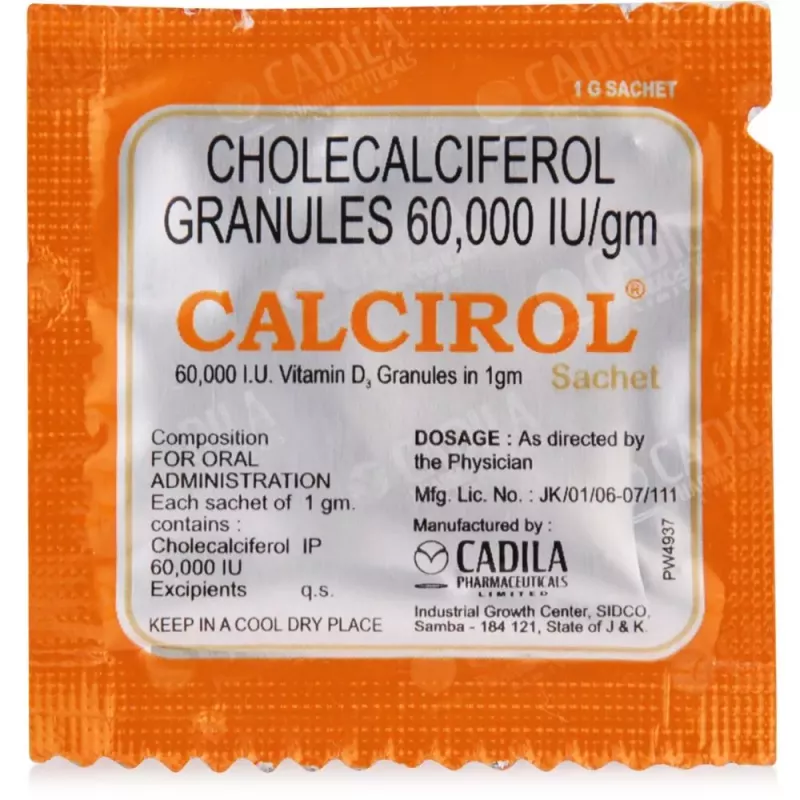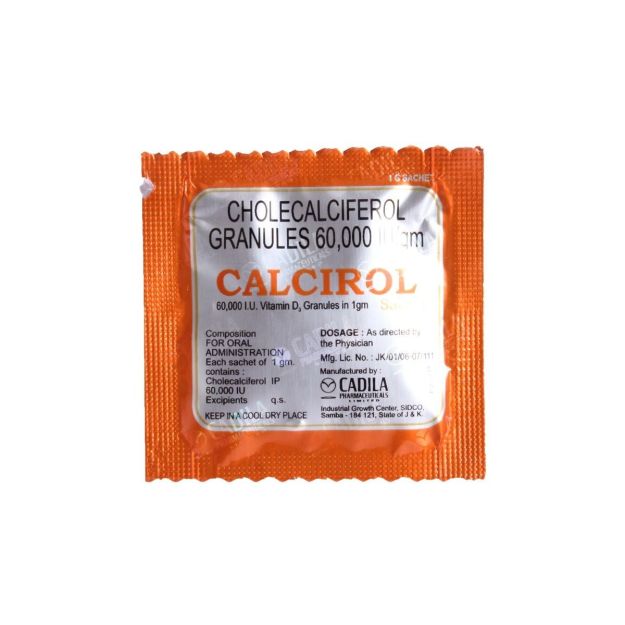

5 people has bought recently
(Inclusive of all taxes)
Pack Size1 Sachet of 1 gm Granules

Calcirol Sachet is used to manage vitamin D deficiency. It is also recommended to maintain strong bones and improve bone mineral density in people with osteoporosis and bone disorders. The presence of vitamin D3, a fat-soluble vitamin, helps the gut to absorb calcium from food. It also helps the body to maintain adequate levels of two minerals essential for bone health, calcium and phosphorus. This further enables the body to preserve bone health. The body makes vitamin D when our skin gets exposed to sunlight. Sunscreen, protective clothing, limited exposure to sunlight, dark skin, and age may reduce the absorption of the sun. As a result, the production rate of vitamin D in the body gets affected and may result in vitamin D3 deficiency. Thus, vitamin D3 in this capsule may help maintain vitamin D3 for better calcium absorption in the body. Along with that, this vitamin has a significant role in helping the absorption of calcium and phosphates from the bowel. The Indian council of medical research (ICMR) recommends a daily supplement of 400 IU/day of vitamin D3 for Indians, with an emphasis on outdoor activities to achieve adequate amounts of vitamin D. Lack of vitamin D can make you prone to numerous health complications such as osteoporosis, infections, allergies, autoimmune diseases, cardiovascular diseases, tuberculosis, depression, and even cancer. It is advised to maintain the level of vitamin D3 in the body. Do not take more than the recommended dose, as it may lead to various side effects, including excessive loss of calcium from the bones. If you have any doubts or wish to know the dose, consult your doctor before taking it.
Key Ingredients:
Cholecalciferol granules (vitamin D3): 60,000 IU
Key Benefits:
Effects of Deficiency:
Lack of vitamin D may affect bones, teeth and muscles health
Product Form:
Sachet
Directions for Use:
Safety Information:
Quick Tips:
Frequently Asked Questions:
Q. How to eat Calcirol sachet?
The recommended dose is 1 sachet per day, preferably during meals. All you have to do is pour the contents of the sachet into a glass of water or milk. Stir with a spoon to ensure all the constituents are mixed properly and drink up.
Q. What is the best time to take Calcirol?
Though vitamin D3 capsules can be taken with or without food, these capsules are best absorbed when taken orally after a meal. Ideally, vitamin D3 supplements should be taken along with the largest meal of the day or with milk.
Q. Which form of Vitamin D is best?
Vitamin D is a fat-soluble vitamin which is naturally present in very few foods. Vitamin D supplements are available in two forms: vitamin D2 (“ergocalciferol” or pre-vitamin D) and vitamin D3 (“cholecalciferol”). While vitamin D2 is produced in plants and fungi, vitamin D3 is produced in animals, including humans. Both these forms (vitamin D2 and D3) are available as over-the-counter (OTC) dietary supplements in medical stores. While vitamin D2 has been used in prescription medicines for a long time, vitamin D3 is also found to be equally effective in boosting vitamin D levels. Hence, irrespective of the form of the supplement, it is advised to ensure your daily intake of this vitamin, either through diet or supplement.
Q. Can I take Calcirol with milk?
Yes, it is advised to take this product with milk as it helps in better absorption. All you have to do is tear open the sachet and pour the powder into a glass and add milk. Drink the suggested quantity of the mixture as directed by the physician.
Q. Is it better to take vitamin D every day or once a week?
The dosage of vitamin D will depend on the levels of vitamin D3 in your body and your health problem (which includes the severity of your condition). So, it would be best to consult your doctor for a detailed analysis of your condition and your dose requirement. However, certain studies have proved that daily vitamin D was more effective than weekly. So talk to your doctor to know the right dose suitable for you.
Q. What are the signs and symptoms of vitamin D3 deficiency?
There are no confirmed signs which can indicate vitamin D deficiency which is why most people remain unaware of any possible deficiency. Low levels of Vitamin D in the body can make you more prone to infections and may cause hair loss. Some may also feel tired/fatigued, depressed, suffer from bone pain and experience muscle pain.
Q. What is the best time to take Vitamin D3 capsules?
Though Vitamin D3 capsules can be taken with or without food, these capsules are best absorbed when taken orally after a meal. Ideally, vitamin D3 supplements should be taken along with the largest meal of the day or with milk.
Note:
Although it is not very common, levels of vitamin D can exceed normal limits in the body. It usually happens due to an overdose of vitamin D supplements. Increased levels of Vitamin D in the blood can cause increased absorption of calcium from the digestive system. This may result in increased levels of calcium in the blood (hypercalcemia). In severe cases, it can lead to kidney failure and artery calcification (hardening of the arteries due to calcium deposition).
We're always working to keep our product images current, but occasionally the manufacturer might update the design. No worries though!
You'll always receive the latest version available, including the freshest expiry date according to the manufacturer's stock.
Rest assured, we are happy to help!
VINAY PHARMACEUTICALS | GSTIN: 07AMZPK2533P1Z8
WB-1 ground floor, Shakarpur, New Delhi-110092, India2016-2025 © All Rights Reserved by EGMEDI In compliance with Drugs and Cosmetics Act 1940 and Drugs and Cosmetics Rules 1945 , we do not process requests for Schedule X and other habit forming drugs.
